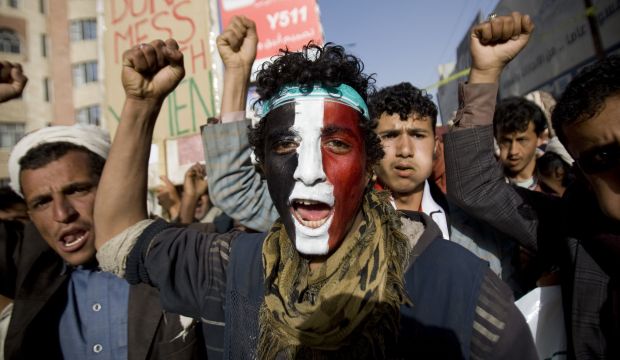
A Houthi rebel with Yemen’s flag painted on his face chants slogans during a rally to show support for the Houthis in Sana’a, Yemen, on February 27, 2015. (AP Photo/Hani Mohammed)
Sana’a, Asharq Al-Awsat—Questions have been raised once again about the viability of national dialogue in Yemen to resolve the deteriorating political situation as factions failed to agree on a city to host the UN-brokered negotiations.
UN envoy to Yemen Jamal Benomar has been tasked with naming a location for the talks, with some sources saying that he intends to name the southern city of Taiz. While Hadi and his supporters would welcome Taiz as the location for dialogue, other factions are refusing to attend talks outside the capital Sana’a.
The latest hurdle comes after President Abd Rabbuh Mansur Hadi fled house arrest in Sana’a last week for the southern port city of Aden. He retracted his resignation and has been recognized as the “legitimate” president of Yemen by the UN Security Council, with Saudi Arabia and a number of other Gulf states re-opening their embassies in Aden. The Iran-backed Shi’ite Houthi militia, meanwhile, remains in control of the capital Sana’a, and has dubbed Hadi a “fugitive from justice.”
Hadi has refused to attend any meetings in Sana’a, calling on the UN to hold the talks in a “safe” city, warning that the Houthis’ complete control of the capital could allow the group to intimidate or arrest participants.
However, Yemen’s ruling General People’s Congress (GNC) party—which sacked Hadi as leader in November last year—is refusing to attend any dialogue outside Sana’a. The Houthis have also explicitly rejected holding the negotiations elsewhere.
A senior official in the opposition Joint Meeting Parties, speaking to Asharq Al-Awsat on the condition of anonymity, said: “This is new evidence of the coordination and cooperation between the GNC and Houthis in the occupation of the capital Sana’a and the capture of cities in the north of the country.”
The source said that the inability to even agree on a location for the meet indicates that the internationally-brokered talks are doomed to failure with each side refusing to budge from its position.
Meanwhile, President Hadi met with local officials and supporters in Aden to discuss the political situation, including Ma’rib governor Sultan Al-Arada.
“The most important thing that was discussed was how to militarily secure our regions, and particularly Ma’rib, from the Houthis,” a source who attended the talks told Asharq Al-Awsat.
Yemen’s central Ma’rib region is a strategic energy hub, Governor Arada has been an outspoken critic of the Shi’ite Houthis, warning that Ma’rib residents—predominately Sunnis—will not accept Houthi control of the region.
